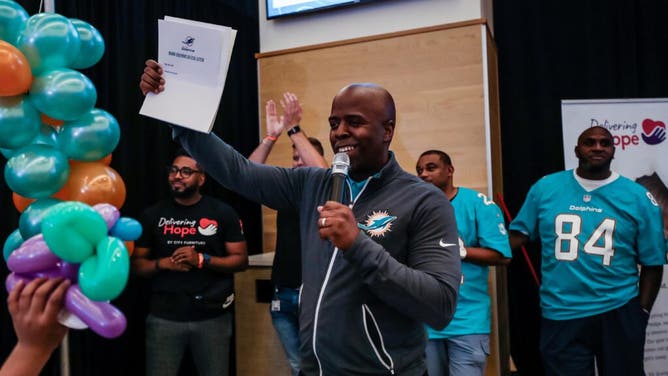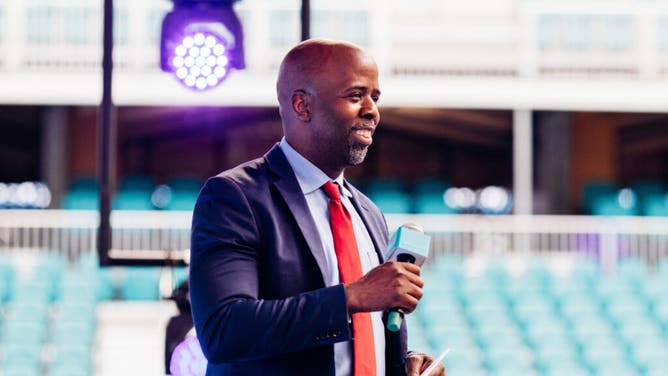NFL Mourns Loss Of Dolphins Senior Vice President Jason Jenkins At Age 47
It's been two days and the rest of the world continues to spin while the NFL continues to do business. Games have been played, players have been signed and cut, and the 2022 regular-season beckons.
But this one is going to feel different.
Because this one will be played without Dolphins senior vice president Jason Jenkins.
Jenkins died suddenly on Saturday afternoon. He was only 47. A cause of death is still not official.
And maybe you never heard of Jenkins because he didn't don a helmet and pads or prowl a sideline as a coach. But all he did was touch countless lives. And serve as one of the sport's great ambassadors.

Miami Dolphins SVP of Communications Jason Jenkins during the Delivering Hope - CITY Furniture event on Friday, July 29, 2022 in Miami Gardens, Fla. (Lauren Sopourn/Miami Dolphins via AP)
In a game populated by giant bodies and giant names this was a man of giant values.
If Jason Jenkins was in a room, you knew it. Because he made it his mission to meet you and make you feel important.
If Jason Jenkins was on the job, things were about to get better. Because he viewed his assignment to be one of service for the greater good.
Jenkins made his mark improving the Dolphins' standing in their community -- and not just among ticket-buying fans that helped his employer. He improved the team's standing in communities rarely touched by intentional NFL outreach.
So the poor were on his radar.
The hungry were on his radar.
Cancer victims were on his radar.
People of many faiths and people with no faith were on his radar.
"Jason was a beacon of the community," Dolphins quarterback Tua Tagovailoa said.
"Jason was the kind of man we all hope to be; kind, funny, selfless, and humble," Dolphins CEO and President Tom Garfinkel said. "He positively impacted everyone he came in contact with and was beloved.
"He made a real impact on people's lives, treated everyone with dignity, and objectively served all of humanity instead of interests or agendas. He was professionally irreplaceable but mostly, I just loved him and will miss my friend."
He was married to the lovely Elizabeth and they had three young children Liya, Aiden and Sloane. And although his many, many assignments with the Dolphins often bled into 16-, and sometimes even 18-hour days, he always had his family on his mind and in his heart.
"They're my life," he once told me.
I cannot imagine the heartbreaking conversation Elizabeth had with her children over the weekend -- explaining that dad's gone and he isn't coming back. The assignment hurts to think about.
The Dolphins also face an impossible assignment because they will not be able to find one person to do everything Jenkins did for them.
Jenkins was basically the right-hand man to the entire organization.
He kept owner Stephen Ross from stepping on landmines. He presented ideas to and faithfully carried out orders from Garfinkel. He befriended coaches and players and earned their trust to the point they sought out his opinion.
Oh, yes, and he was a guardian angel to the media.
Jenkins convinced me to go to Haiti with a Dolphins party -- twice.
The first time was right after the terrible earthquake of 2010 that killed nearly a quarter of a million people. Dolphins alumni, volunteers and staff landed on that ravaged island and passed out water to the thirsty and supplied food for the hungry from a camp near the airport, even as violence was reported throughout Port-au-Prince.
When I told Jenkins I was going to grab a ride to see the damage around the capital, he told me he was coming too.
"Because I'm not having you kidnapped or something," he said.
"What could you do to stop that?" I asked.
"Nothing, except they'd have to take me first," he said.
Jenkins was an honest broker. He often couldn't tell me everything. He sometimes couldn't tell me anything.
But he didn't lie.

Miami Dolphins SVP of Communications Jason Jenkins speaking during the MGP Community event during the F1 Miami Grand Prix weekend on Thursday May 5th, 2022 in Miami Gardens, Fla (Robby Illanes/F1 Miami GP).
He was on the job morning, noon, and night. Literally.
He'd sometimes show up to a local morning drive radio show that starts at 6 a.m., waiting in studio before the host arrived. And he often ended his day at a function that lasted into the night as the representative of the team he loved.
It was fitting, if also extremely sad, that his final moments came while he was working Saturday afternoon.
That he'd felt ill for a couple of days, gotten medical attention that proved inutile, and dutifully reported for work Saturday anyway is a call for perspective. Because, friends, the NFL is imperative to us all, but one's health must be paramount to us all.
And now it might be easy to believe the Dolphins lost one of their own on Saturday and that team is only one of 32. That's wrong thinking.
Jenkins was an NFL icon respected by teams and people around the league. Nearly a dozen teams from coast to coast mourned his passing on social media. Consider:
And this:
There was a moment of silence in the MetLife Stadium press box to honor Jenkins before the Jets and Giants played on Sunday.
The Dolphins, like many NFL teams searching for a winning formula, have worn out multiple coaches over the years. They've worn out multiple personnel people. They've worn out many staffers.
They all came and went during the 14 years Jenkins worked for the team and some of them, no fans of the Dolphins these days, reached out privately Saturday and Sunday.
They were all stunned.
They were all grieving.
They all spoke of how uplifting Jenkins always was in good times and bad.
The NFL won't stop because he's gone. The show must go on.
But the league and indeed the planet is a lesser place now without Jason Jenkins.
Follow on Twitter: @ArmandoSalguero